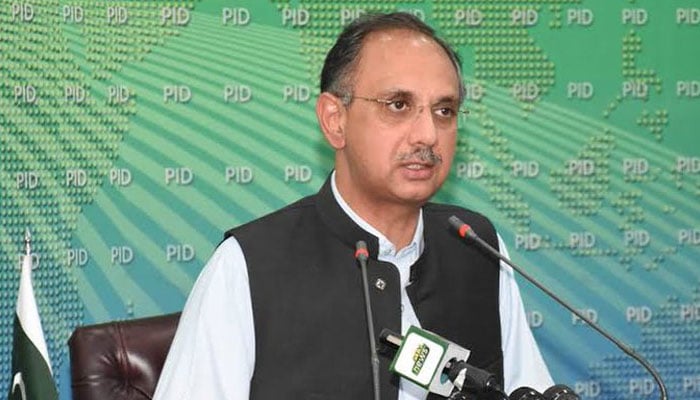Pace of circular debt accumulation reduces: Omar Ayub Khan
ISLAMABAD: The government is working hard on ending the power sector circular debt which is currently standing at Rs850 billion and the pace of its accumulation has sizably reduced to only Rs10 to 11 billion a month from previous Rs39 billion/month. By December 2020, the country would have zero circular debt, Minister for Power Division Omar Ayub Khan on Monday said.
The government is also planning to install ‘floating solar panels’ on country’s big water reservoirs and along canals to generate thousands of megawatts clean energy, as the government has prioritized increasing share of renewable energy in its total power generation pie.
He said that floating solar panels were being installed at Tarbela, Mangla and Ghazi Barotha, Khanpur reservoirs and along canals. It would not only help reduce water evaporation but also generate electricity, he added.
The minister said this while speaking at a conference on “Water Crisis: An Imminent Danger to Pakistan’s stability” here on Monday.
Omar Ayub also warned India that it would swiftly retaliate if New Delhi violates the Indus Water Treaty, “If India tries to make Indus Water Treaty as a weapon, then answer from Pakistan will be swift as we will defend our sovereignty.”
He also urged the international community to take notice of Indian unabated atrocities in the Occupied Valley of Kashmir.
The Minister also said that if proper investment was made in water sector, especially water storages, then it has the potential to take up our GDP growth by one percentage points. Despite its importance in economic growth, no work was carried out on construction of dams after Tarbela and Mangla and no big dam was commissioned after 1960.
He said that our government was actively working on a plan to harness water resources in the country in order to add 18,000-20,000 MW hydel power generation to the system. The Minister said that current power generation installed capacity from all sources stands at 31,000 MWs which would be enhanced to 55,000 MWs by 2030.
He also said that by year 2025, around 8000 MWs of renewable energy would be added to the system and 20,000 MWs by 2030. He criticised the PML-N government for shelving renewable energy projects the reason being to pave way for setting up expensive R-LNG power projects.
Minister further said that the Renewable Energy (RE) Policy draft was unanimously framed after consultation with all provinces. Secretary Energy Sindh government supported the RE draft policy during Alternative Energy Development Board (AEDB) meeting. The cabinet has also approved the RE policy 2019 and now it would come in Council of Common Interest (CCI). The policy aimed at reducing electricity prices in the country, he added
Chief Meteorologist Muhammad Riaz Ahmed said climate change is fast impacting our water resources and expressed fear that rising temperature could aggravate the water crisis in years to come. He called for construction of more water reservoirs for meeting the country future water demand.
A senior official of the Ministry of Energy said that in power sector, circular debt is a major irritant which not only affecting the investment inflow in the sector but also has impacted the performance of the various state-run companies, including PSO and some other public entities.
-
 South Korea: Two Killed As Military Helicopter Crashes During Training
South Korea: Two Killed As Military Helicopter Crashes During Training -
 Elon Musk Unveils SpaceX’s Moon-first Strategy With ‘self Growing Lunar City’
Elon Musk Unveils SpaceX’s Moon-first Strategy With ‘self Growing Lunar City’ -
 Donald Trump Slams Bad Bunny's Super Bowl Performance: 'Absolutely Terrible'
Donald Trump Slams Bad Bunny's Super Bowl Performance: 'Absolutely Terrible' -
 Jake Paul Criticizes Bad Bunny's Super Bowl LX Halftime Show: 'Fake American'
Jake Paul Criticizes Bad Bunny's Super Bowl LX Halftime Show: 'Fake American' -
 Prince William Wants Uncle Andrew In Front Of Police: What To Expect Of Future King
Prince William Wants Uncle Andrew In Front Of Police: What To Expect Of Future King -
 Antioxidants Found To Be Protective Agents Against Cognitive Decline
Antioxidants Found To Be Protective Agents Against Cognitive Decline -
 Hong Kong Court Sentences Media Tycoon Jimmy Lai To 20-years: Full List Of Charges Explained
Hong Kong Court Sentences Media Tycoon Jimmy Lai To 20-years: Full List Of Charges Explained -
 Coffee Reduces Cancer Risk, Research Suggests
Coffee Reduces Cancer Risk, Research Suggests -
 Katie Price Defends Marriage To Lee Andrews After Receiving Multiple Warnings
Katie Price Defends Marriage To Lee Andrews After Receiving Multiple Warnings -
 Seahawks Super Bowl Victory Parade 2026: Schedule, Route & Seattle Celebration Plans
Seahawks Super Bowl Victory Parade 2026: Schedule, Route & Seattle Celebration Plans -
 Keto Diet Emerges As Key To Alzheimer's Cure
Keto Diet Emerges As Key To Alzheimer's Cure -
 Chris Brown Reacts To Bad Bunny's Super Bowl LX Halftime Performance
Chris Brown Reacts To Bad Bunny's Super Bowl LX Halftime Performance -
 Trump Passes Verdict On Bad Bunny’s Super Bowl Halftime Show
Trump Passes Verdict On Bad Bunny’s Super Bowl Halftime Show -
 Super Bowl 2026 Live: Seahawks Defeat Patriots 29-13 To Win Super Bowl LX
Super Bowl 2026 Live: Seahawks Defeat Patriots 29-13 To Win Super Bowl LX -
 Kim Kardashian And Lewis Hamilton Make First Public Appearance As A Couple At Super Bowl 2026
Kim Kardashian And Lewis Hamilton Make First Public Appearance As A Couple At Super Bowl 2026 -
 Romeo And Cruz Beckham Subtly Roast Brooklyn With New Family Tattoos
Romeo And Cruz Beckham Subtly Roast Brooklyn With New Family Tattoos




